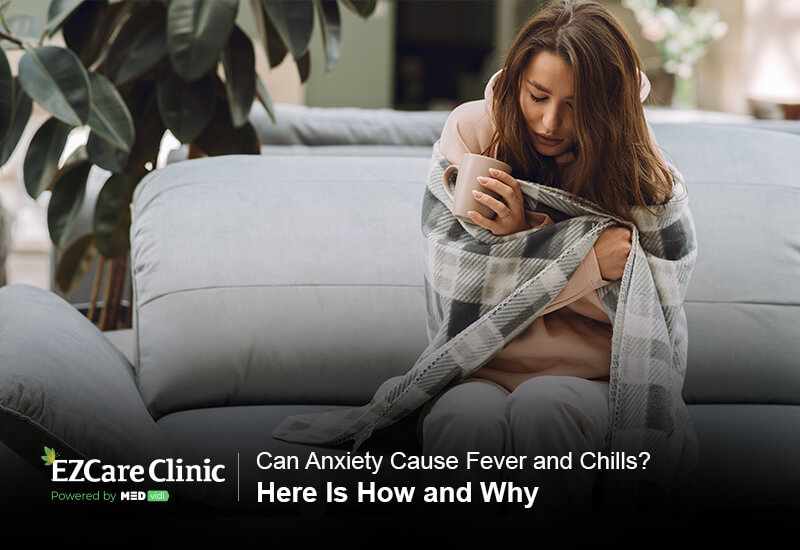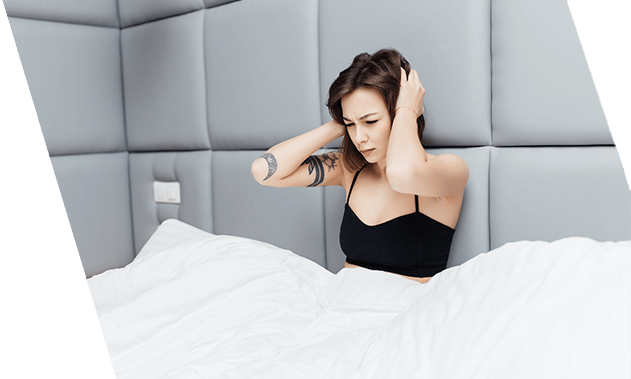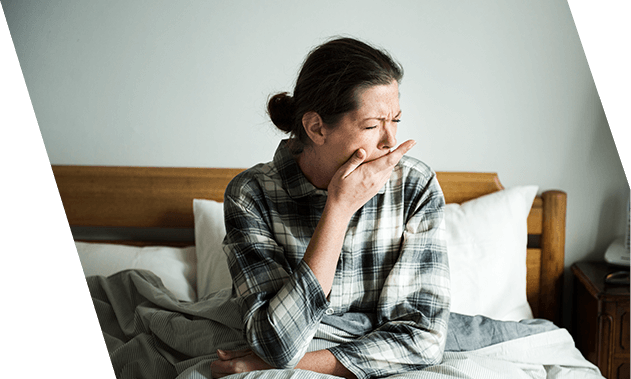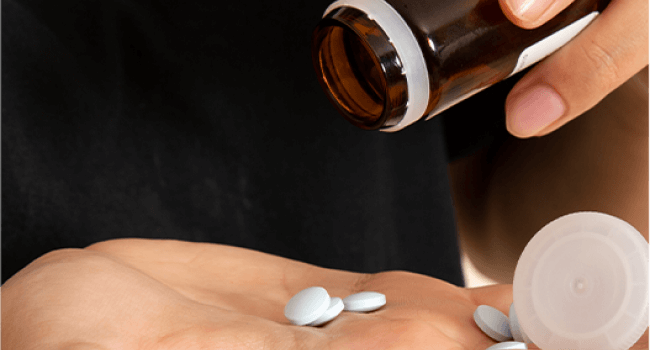Highlights
- Non-addictive anxiety medications include SSRIs, SNRIs, hydroxyzine, buspirone, beta-blockers, pregabalin, gabapentin, PanX, and diphenhydramine.
- These medications are safer for long-term anxiety treatment. They have a lower risk of dependence and abuse.
- Consult with a healthcare provider to select the most suitable medication.
- Professional assistance is essential for severe anxiety and may include therapy and medication for comprehensive care.
The experience of anxiety is common as a natural response to stress. Sometimes, it can be overwhelming, with the symptoms becoming worse. Approximately
Professional help and anti-anxiety medication are some effective methods to control the symptoms. But people often have concerns about the addiction stigma against anxiety medication complicating the decision. This blog post explores non-addictive anxiety medication options and additional coping techniques.
How Do Doctors Determine If You Need Anxiety Medication?
When an individual has recurring anxious thoughts and feelings, a healthcare provider conducts a comprehensive assessment. This typically involves an overview of a detailed medical and psychological history, physical examination if required, and diagnostic tests. All this helps to determine if the person meets the criteria to be diagnosed with an anxiety disorder.
After making a diagnosis, a clinician determines the most suitable course of treatment. It may or may not include an anxiety medication prescription, depending on several factors, such as:
- Severity and duration of symptoms.
- Symptoms’ impact on daily functioning.
- Any co-occurring mental health conditions.
If it becomes clear that to function properly, a person needs anxiety medication, a healthcare provider writes a prescription. They may also recommend scheduling a few talk therapy sessions along with pharmacological treatment to support long-term results. The goal is to develop a treatment plan tailored to individual needs.
Controlled Substances vs. Non-controlled Substances for Anxiety
|
Controlled Substances |
Non-controlled substances |
|
Effective for short-term relief. |
Safer for long-term treatment. |
|
Higher potential for abuse and dependency. |
Lower potential for abuse and dependency. |
|
Regulated by government agencies and typically require strict monitoring. |
Not subject to the strict regulations, still requiring close monitoring. |
|
Examples: Benzodiazepines such as alprazolam (Xanax) and diazepam (Valium) |
Examples: SSRIs, SNRIs, buspirone, beta-blockers, pregabalin, gabapentin, hydroxyzine, PanX, and diphenhydramine. |
Why Is Anxiety Medication Addictive?
Anxiety medications can be addictive because they act quickly on the neurotransmitters, affecting the brain’s reward system. For instance,
Is There a Non-addictive Anti-anxiety Medication?
Yes, there are several non-addictive medications. They generally work more gradually and have a lower potential for abuse. They are often preferred for long-term management as they carry fewer risks compared to controlled substances.
Benefits of Non-Addictive Anxiety Medication
These medications offer several benefits:
- Safety profile: Lower risk of dependence and abuse.
- Long-term use: Suitable for prolonged treatment without potential for developing tolerance to the medication
- Fewer withdrawal symptoms: Reduced risk of severe withdrawal symptoms compared to addictive medications.
- Better compliance: Patients are more likely to adhere to treatment plans without the fear of addiction.
- Overall well-being: Effective treatment can improve quality of life and daily functioning.
MEDvidi offers personalized treatment plans, including medication prescriptions if appropriate. Book an appointment today!
A List of Non-addictive Anxiety Medication Options
If you are diagnosed with an anxiety disorder and receive a prescription for non-addictive medication, remember that you still have to get supervision from your healthcare provider during the course of treatment.
Below is the list of the most commonly prescribed non-addictive anxiety medications:
- Selective serotonin reuptake inhibitors (SSRIs)
- Serotonin and norepinephrine reuptake inhibitors (SNRIs)
- Hydroxyzine (Vistaril)
- Buspirone (Buspar)
- Beta-blockers
- Pregabalin (Lyrica)
- Gabapentin (Neurontin)
- PanX
- Diphenhydramine
Selective Serotonin Reuptake Inhibitors (SSRIs)
SSRIs work by increasing the amount of the neurotransmitter serotonin which is primarily responsible for boosting mood. They are commonly prescribed for depression but have also shown great potency to reduce anxiety symptoms and the signs of obsessive-compulsive disorder (OCD) and post-traumatic stress disorder (PTSD).
The most common SSRIs include the following:
Serotonin and Norepinephrine Reuptake Inhibitors (SNRIs)
SNRIs are most commonly prescribed for generalized anxiety disorder (GAD) and panic disorder. Similar to SSRIs, SNRIs act on the reuptake of norepinephrine along with serotonin. These medications are known to produce positive effects on the mood. Examples of SNRIs include:
- Duloxetine (Cymbalta)
- Venlafaxine (Effexor)
Hydroxyzine (Vistaril)
Hydroxyzine is commonly
Buspirone (Buspar)
The mechanism of action and effects of anxiolytic
Beta-blockers
Beta-blockers are not the first-line medications for anxiety, as these do not change the brain’s chemical balance. The results produced by beta-blockers are temporary, so they are prescribed for the short term. Some common options are as follows:
- Propranolol (Inderal)
- Atenolol (Tenormin)
- Acebutolol (Sectral)
Pregabalin (Lyrica)
Pregabalin is used for
Gabapentin (Neurontin)
Gabapentin is similar to pregabalin and is used off-label for
PanX
PanX is a newer option that combines two types of active ingredients known for their safety profile and non-addictive properties: beta-blockers and antiemetic antimuscarinic agents. It’s a compounded medication available by prescription for anxiety but its use for this condition hasn’t been approved by the FDA yet.
Diphenhydramine
Diphenhydramine is an over-the-counter antihistamine that can have sedative effects. While not typically prescribed for anxiety, it can be used for short-term relief of mild symptoms.
NOTE: Any medication should only be administered under the proper guidance and prescription of a licensed healthcare professional.
Side Effects
|
Medication |
Side Effects |
|
Selective serotonin reuptake inhibitors |
|
|
Serotonin-norepinephrine reuptake inhibitors |
|
|
Hydroxyzine |
|
|
Buspirone |
|
|
Beta-blockers |
|
|
Pregabalin |
|
|
Gabapentin |
|
|
Diphenhydramine |
|
The side effects of non-addictive anxiety medication usually subside after three to four weeks. However, promptly contact your healthcare provider if the side effects don’t subside and there are any adverse reactions. Don’t stop taking the medications abruptly on your own because some of these medicines are associated with withdrawal effects. Instead, talk to your doctor about tapering your dose.
Coping Techniques for Dealing With Anxiety
Non-addictive anxiety medication remains one of the standard treatment options, but some self-help coping skills can support the recovery process. These include:
- Listening to music is
known to relieve anxiety[8] . - Perform square breathing: inhale for 5 seconds, hold the breath for 5 seconds, exhale for 5 seconds, pause for 5 seconds, and repeat.
- Practicing
mindfulness[9] and guided meditation can help promote relaxation and present-moment awareness. Regular physical activity[10] (for example, daily for 30 minutes) can release particular chemical substances called endorphins, which improve mood and reduce worrying.- Eating a balanced diet can positively impact mental health.
- Ensuring adequate and quality sleep can help manage anxious feelings.
- Deep breathing and progressive relaxation techniques can help calm the mind.
- Writing down thoughts and feelings through journaling can provide an outlet for disturbing thoughts and help identify triggers.
- Cognitive-behavioral therapy (CBT) is particularly effective for anxiety disorder treatment.
When to Seek Professional Help
If anxiety becomes overwhelming and unmanageable, it is important to seek professional help. Non-addictive medication helps manage the symptoms and should only be taken under prescription and guidance. A healthcare provider may also recommend combining medication with talk therapy.
Conclusion
Non-addictive medications offer a viable option for those seeking relief from anxiety with a low risk of dependence. Some associated adverse effects usually subside within a few weeks.
SSRIs, SNRIs, hydroxyzine, buspirone, beta-blockers, pregabalin, gabapentin, PanX, and diphenhydramine are among good options. Coupled with lifestyle changes and coping techniques, these medications can significantly improve the quality of life.
Frequently Asked Questions
How long does it take for non-addictive anxiety medication to start working?
Non-addictive anxiety medications vary in their onset of action. SSRIs and SNRIs typically take 4 to 6 weeks to show effects, with some improvement possible within 2 weeks. Buspirone generally takes 2 to 6 weeks to show full effect. Beta-blockers like propranolol can work within an hour. Antihistamines such as hydroxyzine provide calming effects within 30 minutes to an hour, suitable for short-term relief. Note that the effects of the same medication on different patients may vary; consult with a healthcare provider to learn more.
Can non-addictive anxiety medication be taken long-term?
Yes, non-addictive medications can often be taken long-term (if deemed appropriate by a healthcare provider). SSRIs, SNRIs, and buspirone are commonly prescribed for safe long-term use to manage chronic anxiety disorders. It is important to get monitored regularly by a healthcare provider to ensure effectiveness and manage side effects under their guidance.
What anxiety medications are not controlled substances?
These include SSRIs (sertraline (Zoloft) and escitalopram (Lexapro)), SNRIs (venlafaxine (Effexor) and duloxetine (Cymbalta)), buspirone, certain antihistamines (hydroxyzine), and beta-blockers (propranolol).














